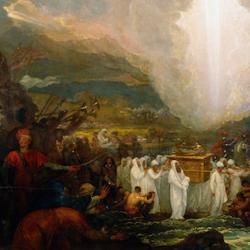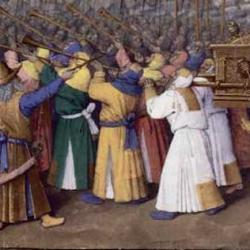Andrzej Toczyski’s The “Geometrics” of the Rahab Story offers an insightful, multi-layered close reading of Joshua 2.
His syntactical analysis of the chapter examines the features of the text that steer the reader’s involvement in the story. His aim is to show how Joshua has been and is a “vehicle of literary communication.” The book includes detailed discussions of pre-modern, modern, and postmodern readings of the chapter, as well as Toczyski’s own discussion.
He devotes a section of his own reading to a discussion of the chronological obscurities of the story: “In the first chapter, Joshua announced the crossing of the Jordan in three days (cf. Josh 1:11). Presumably on the same day, he sent the spies. . . . After leaving Jericho, they stayed in the mountains for the three days (cf. Josh 2:22) and only then returned to Joshua. This implies that their mission has taken at least three days.” Yet, “in the third chapter the reader is informed that the Israelite camp is still in Shittim, as if time had stopped, and will move next day to the riverbank and eventually cross the river again only after three days.”
Toczyski doesn’t try to harmonize the chronology (which he thinks impossible) but asks about the literary effect of this chronological puzzle. It suggests, he thinks, that the ordering of these chapters is more thematic than chronological, and forces the “critical reader” to ask why the Rahab story is embedded in the place that it is.
His answer is very stimulating. First, he notes that “the book of Joshua occupies a strategic position in the mega-narrative Genesis–Joshua–2 Kings as it describes the realization of repeatedly foretold promises of the Land.” Being at the beginning of this strategic book, the story of Rahab “occupies the ‘key position’ just before that promise becomes true. In other words, the Rahab story in its present context marks the boundary between the promise of the Land and its fulfilment.”
He links this to the use of the phrase “hear a report” in Joshua. Each time it’s used, the phrase “introduces different objects of what exactly have been heard and hence caused a specific response.” Further, “there is a certain progression from the events which had happened in the remote history to those more recent in relation to the hearer(s).” The progression is as follows:
1)Crossing of the Red Sea and victories beyond the Jordan
2) Crossing of the Jordan river
3) General reference which can apply to the conquest of Jericho and Ai or to the reading of the law in Josh 8:30–35
4) The conquest of Jericho and Ai
5) The conquest of Jericho and Ai and the alliance of Gibeonites with Israel
6) General reference which apply to diverse victories of Joshua
In short, as Joshua progresses, “‘the story’ forges ahead to tell how God assisted and led his people from the crossing of the Red Sea through the crossing of the Jordan and beyond.” It’s “like a ‘pile of fire’ or ‘hornets,’ which wreak more havoc than the troops of Joshua.”
The story has different effects on different hearers. Some ally with Israel (Rahab, Gibeonites) while others are frightened or provoked into resistance. It’s the story that changes Rahab: Because of the story, she renounces Jericho and boldly takes up Israel’s cause. (NT gloss: James says she had faith, and faith comes by hearing! Plug in too Matthew Bates’s claim that “faith” implies “loyalty.”)
Toczyski observes that “Rahab and Joshua are the only characters whose proper names are explicitly mentioned in the story.” That not only indicates Rahab’s importance in the narrative, but hints that the name itself might be significant. The word means “wide” or “opened,” and may refer to the “openness” of her profession. Her name is given immediately after we learn that she is a prostitute.
On the other hand, “Rahab” could point to positive character qualities: “it can underline interior qualities of the character such as openness, kindness and hospitality.” Further, he name might reveal ” he deepest theology of the book of Joshua, namely, that the land ‘lies opened’ for Israelites. In fact, the verbs built from the same letters as Rahab’s name were used inter alia to describe the expanse of the land” (Genesis 26:22; Exodus 34:24). When Joshua send the spies, they learn that in fact the land is “rahab” opened for them, ripe for the picking.
The fact that Rahab is a Canaanite suggests another dimension of her name: “the Land is also ‘wide’ and ‘spacious’ to accommodate both parties within it, though only if they come to terms. The case of Rahab and the Gibeonites clearly shows that it is possible.”
The text is written in such a way as to polarize Rahab and the king of Jericho. We read of the king’s command, but we never learn that the command was delivered; we read only Rahab’s response, and assume that the messenger relayed the king’s order. Thus, “by bypassing the moment of delivery, the narrator accelerates the action and enhances the reader’s instantaneous impression that the matter is playing out directly between Rahab and the king.”
Rahab in fact takes command from the king, suggesting that the soldiers go search for the spies. Yet she seizes the initiative by playing on female stereotypes. “Oh, I declare. I didn’t know they were spies, honey. Oh, I wouldn’t’a let them go if I knew they were spies” (spoken in a breathy Gone-With-the-Wind Southern accent).
The crux of the whole narrative is Rahab’s account of the story, of what she heard (Joshua 2:8-13). This comes at the chiastic center of the story, when we have already seen the panic that the spies arouse in Jericho. Only when we hear Rahab’s explanation, though, do we know why the king is so anxious.
The emphasis on the “story” also highlights a crucial aspect of the conquest. It’s a military operation, to be sure. But it’s also a propaganda campaign, organized by Yahweh and not by Joshua. Rumors spread, hearts melt, some ally with Israel, others flee. It’s conquest by word, conquest by the good news of the Exodus.
For Rahab, the story is also critical: “the story/report transformed Rahab’s worldview and had shaken her previous reliance on the local deities. Her faith and dream about a different life was shaped by actively listening to that story, which later pushed her to ally with newcomers.”












